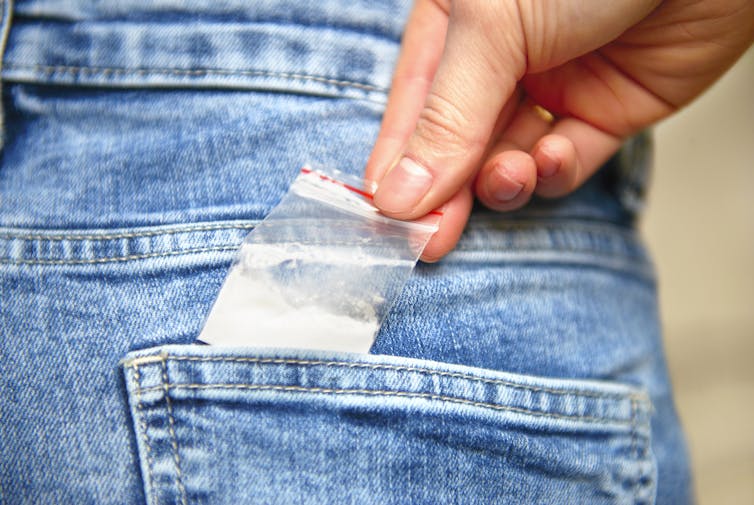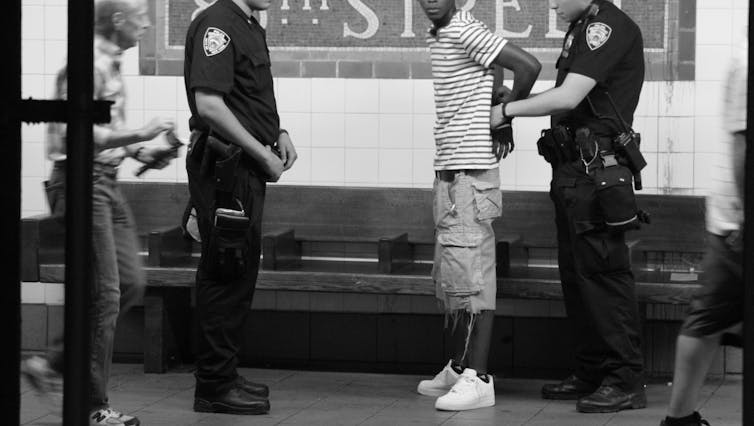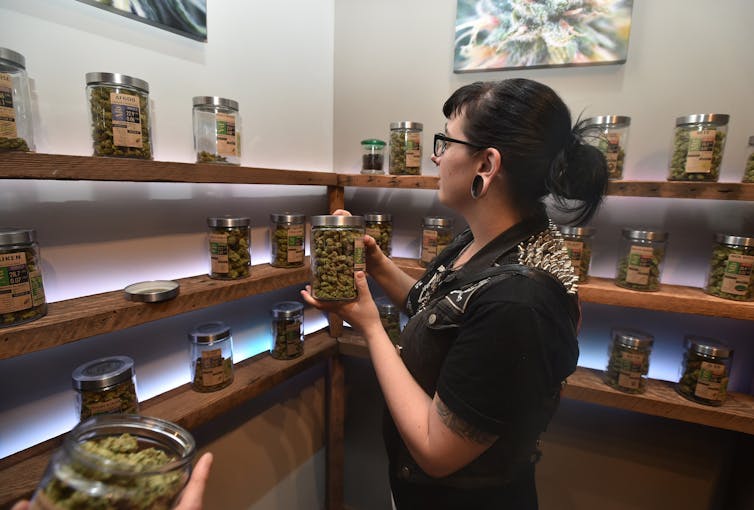
Experts in autocracies have pointed out that it is, unfortunately, easy to slip into normalizing the tyrant, hence it is important to hang on to outrage. These incidents which seem to call for the efforts of the Greek Furies (Erinyes) to come and deal with them will, I hope, help with that. As a reminder, though no one really knows how many there were supposed to be, the three names we have are Alecto, Megaera, and Tisiphone. These roughly translate as “unceasing,” “grudging,” and “vengeful destruction.”
This is an “Oregon Leads the Way” feel-good story. With information, and leads to more information, for any state which wants to do what Oregon has done.
================================================================
Oregon just decriminalized all drugs – here’s why voters passed this groundbreaking reform

Peter Dazeley via Getty
Scott Akins, Oregon State University and Clayton Mosher, Washington State University
Oregon became the first state in the United States to decriminalize the possession of all drugs on Nov. 3, 2020.
Measure 110, a ballot initiative funded by the Drug Policy Alliance, a nonprofit advocacy group backed in part by Facebook’s Mark Zuckerberg, passed with more than 58% of the vote. Possessing heroin, cocaine, methamphetamine and other drugs for personal use is no longer a criminal offense in Oregon.
Those drugs are still against the law, as is selling them. But possession is now a civil – not criminal – violation that may result in a fine or court-ordered therapy, not jail. Marijuana, which Oregon legalized in 2014, remains fully legal.
Oregon’s move is radical for the United States, but several European countries have decriminalized drugs to some extent. There are three main arguments for this major drug policy reform.
#1. Drug prohibition has failed
In 1971, President Richard Nixon declared drugs to be “public enemy number one” and launched a “war on drugs” that continues today.
The ostensible rationale for harshly punishing drug users is to deter drug use. But decades of research – including our own on marijuana and drugs generally – has found the deterrent effect of strict criminal punishment to be small, if it exists at all. This is especially true among young people, who are the majority of drug users.
This is partly due to the nature of addiction, and also because there are simply limits to how much punishment can deter crime. As a result, the U.S. has both the world’s highest incarceration rate and among the highest rates of illegal drug use. Roughly 1 in 5 incarcerated people in the United States is in for a drug offense.
Criminologists find that other consequences of problematic drug use – such as harm to health, reduced quality of life and strained personal relationships – are more effective deterrents than criminal sanctions.
Because criminalizing drugs does not really prevent drug use, decriminalizing does not really increase it. Portugal, which decriminalized the personal possession of all drugs in 2001 in response to high illicit drug use, has much lower rates of drug use than the European average. Use of cocaine among young adults age 15 to 34, for example, is 0.3% in Portugal, compared to 2.1% across the EU. Amphetamine and MDMA consumption is likewise lower in Portugal.

Horacio Villalobos – Corbis/Corbis via Getty Images
2. Decriminalization puts money to better use
Arresting, prosecuting and imprisoning people for drug-related crimes is expensive.
The Harvard economist Jeffrey Miron estimates that all government drug prohibition-related expenditures were US$47.8 billion nationally in 2016. Oregon spent about $375 million on drug prohibition in that year.
Oregon will now divert some the money previously used on drug enforcement to pay for about a dozen new drug prevention and treatment centers statewide, which has been found to be a significantly more cost-effective strategy. Some tax revenue from recreational marijuana sales, which exceeded $100 million in 2019, will also go to addiction and recovery services.
Oregon spent about $470 million on substance abuse treatment between 2017 and 2019.
Not everyone who uses drugs needs treatment. Decriminalization makes help accessible to those who do need it – and keeps both those users and recreational users out of jail.
3. The drug war targets people of color
Another aim of decriminalization is to mitigate the significant racial and ethnic disparities associated with drug enforcement.

Third Eye Corporation/Getty
Illegal drug use is roughly comparable across race in the U.S. But people of color are significantly more likely to be searched, arrested and imprisoned for a drug-related offense. Drug crimes can incur long prison sentences.
Discretion in drug enforcement and sentencing means prohibition is among the leading causes of incarceration of people of color in the United States – an injustice many Americans on both sides of the aisle increasingly recognize.
Freed up from policing drug use, departments may redirect their resources toward crime prevention and solving violent crimes like homicide and robbery, which are time-consuming to investigate. That could help restore some trust between law enforcement and Oregon’s communities of color.
Risks of decriminalization
One common concern among Oregonians who voted against decriminalization was that lessening criminal penalties would endanger children.
“I think it sends a really bad message to them, and influences their perception of the risks,” James O’Rourke, a defense attorney who helped organize the opposition to measure 110, told Oregon Public Broadcasting in October.
But U.S. states that legalized marijuana haven’t seen adolescent use rise significantly. In fact, marijuana consumption among teens – though not among college-aged Americans – actually declined in some states with legal marijuana. This may be because legal, regulated marijuana is more difficult for minors to get than black-market drugs.

Josh Edelson/AFP via Getty Images
Research also shows that for some people, particularly the young, banning a behavior makes it more alluring. So defining drugs as a health concern rather than a crime could actually make them less appealing to young Oregonians.
Another worry about decriminalization is that it will attract people looking to use drugs.
So-called “drug tourism” hasn’t really been a problem for Portugal, but it happened in Switzerland after officials in the 1980s and 1990s began officially “ignoring” heroin in Zurich’s Platzspitz Park. People came from across the country to inject heroin in public, leaving discarded needles on the ground.
The local government shut down Platzspitz Park. But rather than chase off or arrest those who frequented it, it began offering methadone and prescription heroin to help people with opioid use disorder. Public injection, HIV rates and overdoses – which had all become a problem in Zurich – plummeted.
Certain parts of Oregon already have higher rates of public drug consumption, namely Portland and Eugene. Because public drug use is still illegal in Oregon, however, we don’t expect a Platzspitz Park-style open drug scene to emerge.
These places should benefit from the expansion of methadone programs and other medication-assisted treatment, which is endorsed by the American Medical Association.
If neighboring Washington state decriminalizes drugs, which it is considering, the chances of drug tourism would drop further.
[The Conversation’s science, health and technology editors pick their favorite stories. Weekly on Wednesdays.]
Upside – and downside
There are risks with any major policy change. The question is whether the new policy results in a net benefit.
In Portugal, full decriminalization has proven more humane and effective than criminalization. Because drug users don’t worry about facing criminal charges, those who need help are more likely to seek it – and get it.
Portugal’s overdose death rate is five times lower than the EU average – which is itself far lower than the United States’. HIV infection rates among injection drug users also dropped massively since 2001.
These policies show that problem drug use is a public health challenge to be managed, not a war that can be won.![]()
Scott Akins, Professor, Sociology Department, Oregon State University and Clayton Mosher, Professor, Sociology Department, Washington State University
This article is republished from The Conversation under a Creative Commons license. Read the original article.
================================================================
Alecto, Megaera, and Tisiphone, treating misuses, abuse, and addiction of and to drugs as a public health problem rather than a political problem just makes so much sense. And it’s not as if we don’t have models for how this approach can work, and even for transitioning to this approach from approaches which don’t work. Look at alcohol. (BTW heartiest congratulations to Sir Anthony Hopkins on 45 years sober.)
And thank you, Oregon, for leading the way.
The Furies and I will be back.
12 Responses to “Everyday Erinyes #247”
Sorry, the comment form is closed at this time.

Thanks Joanne–it never was a cost effective strategy and didn’t even pretend to be humane, just appealed to those who viewed the young, who dared to protest the war in VietNam and other less than moral policies, and persons of color seeking equal rights, to need to be punished for daring to seek change (so called silent majority supposedly). Concurrently, it also satisfied corporate desires for restoring sufficient slave labor to enhance their profits since the constitution permits slave labor by prisoners.
I used to support the war on drugs, and though legalization was surrender – but that is before I was enlightened. The more I read and learn, the more I realize that the answer is legalization, or at least decriminalization. Prohibition merely made alcohol glamorous, and trying to enforce it cost the country dearly.
What Freya wrote.
Yes, legalization and decriminalization of drugs would work better all the way around, imho.
From your article, I also think that it’s more humane and effective than criminalization. It makes sense too.
Thank you, Joanne for post.
fascinating and reasonable…I think Oregon is leading the way into the future…..making it legal may cut down its use, make what use there is safer….and also make US realize that when it is a Problem, it is a health problem and not a moral issue…
The “War on Drugs” was BS from the start, trying to criminalize those who did not buy into the standard story of American capitalism, and wanted progressive issues given their due justice. Before that, J Edgar, and his “Reefer Madness” movement was also so much BS, probably targeting the black segment of the country.
I truly like that they do give “Pro” & “Con” arguments.
(Few things in life are purely Black & White. Trump being an absolute evil a$$hole is the exception that makes the rule.)
Excellent article, Joanne. Thanks for posting.
Criminalisation has never helped win the war on drugs, it usually had a negative effect; something the Dutch had realized many years ago in more progressive times. The results were much the same as those described for Portugal.
Not that the Dutch have turned back the clock, but they stopped from decriminalizing all drugs because it couldn’t be done in isolation. With other nearby countries like France keeping up the war on drugs and at the same time open borders, The Netherlands was overrun by, in their own country, criminal drug runners making a quick visit to buy drugs unhindered, causing a local nuisance. Trying to regulate this for its own citizens, the Dutch government ended up with partial restrictions for all. Oregon needs to be aware of the effects their policies may have on neighbouring states.
Good point. So it’s a very good thing that itsnearest neighbor, California, has legalized Marijuana. I suspect the neighbors to the east will be the biggest hazard. TC will know more than I do on this.
I believe New Jersey also just legalized marijuana, and there was a very amusing ad which was considered to have been influential in that. I’ll try to find it again for toorrow’s viseo thread.
I agree with Freya and Pat’s comments that it legalization of drugs would make it’s better in many ways.
Locking up users for having a small amount of a drug, becomes so costly both for the ones arrested and the state that puts them behind bars for months or even years.
Thanks Joanne
I’m so glad you chose this on. I almost did, but I had a hunch. I have long said that drug abuse is an issue for mental health, not criminal injustice! 💊
Great minds.
JD, thanks for this. Great comments,everyone! Also, when someone OD’s,others hesitate to call 911 if they’ll be charged w/possession (or more). This has happened numerous times in my area. Once the person who OD’d was thrown out of the car in front of hospital,alone. Others have died. I feel bad for family of those incarcerated; a lot for kids, esp. to deal with. Also, I’ve lived in 2 other countries that had harsh laws re: pot,etc.——and they were awash w/alcohol & its pblms.! (S Korea & Hungary).